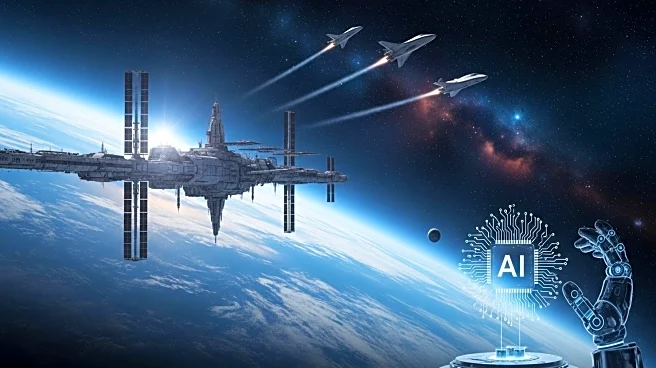What's Happening?
Billionaires Sam Altman, Jeff Bezos, and Elon Musk are advocating for a future where job opportunities extend beyond Earth, driven by advancements in space technology. As AI increasingly affects entry-level jobs, these tech leaders foresee a shift towards careers in space exploration and colonization. Altman, CEO of OpenAI, suggests that by 2035, graduates may pursue lucrative jobs in the solar system. Musk, CEO of SpaceX, anticipates human missions to Mars by 2028, while Bezos, founder of Blue Origin, believes space technology will surpass his previous ventures in profitability. This vision is contrasted by Bill Gates, who prioritizes Earth-based philanthropic efforts over space travel.
Why It's Important?
The predictions by Altman, Bezos, and Musk highlight a potential paradigm shift in the job market, where space exploration could become a significant industry. This shift could alleviate concerns about AI's impact on traditional employment by creating new opportunities in space-related fields. The involvement of major tech figures in space initiatives underscores the growing importance of space technology in future economic and industrial landscapes. However, Gates' focus on Earth-based issues suggests a divide in priorities among influential leaders, emphasizing the need for balanced investment in both space and terrestrial challenges.
What's Next?
As space technology advances, stakeholders may need to address regulatory, ethical, and logistical challenges associated with space employment. Governments and private companies could collaborate to establish frameworks for space exploration and job creation. The development of space infrastructure and technology will likely continue, with potential implications for international cooperation and competition. Additionally, educational institutions may adapt curricula to prepare students for careers in space industries, reflecting the evolving job market.
Beyond the Headlines
The push for space jobs raises ethical questions about resource allocation and the prioritization of space exploration over pressing Earth-based issues. The environmental impact of space activities and the potential for space colonization to exacerbate inequalities are concerns that may require attention. Long-term, the integration of space technology into everyday life could transform cultural perceptions of work and exploration, influencing societal values and aspirations.









